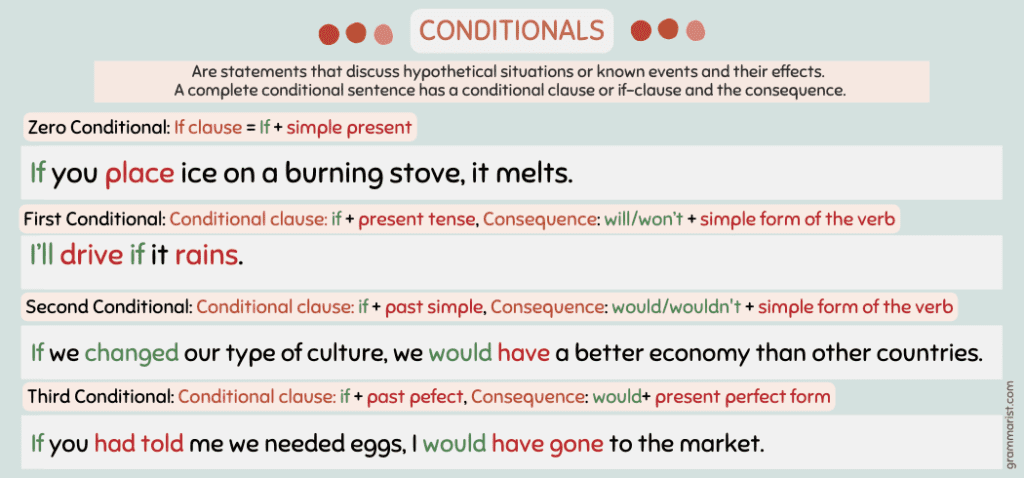Have you heard of the term conditionals? I usually use a conditional when discussing hypothetical situations and their possible rules. But the English language prescribes specific conditional rules for correct usage.
Keep reading to know the actual meaning of conditional and its types. I also explain its different structures and examples.
What are Conditionals?

Conditionals in English grammar are statements that discuss hypothetical situations or known events and their effects. A complete conditional sentence has a conditional clause or if-clause and the consequence. Below is an example.
- If Candace won the game, she would spend the money on a new car.
This statement shows a hypothetical situation, whether possible or not. In this sentence, the conditional clause is If Janice won the game. The consequence clause is she would spend the money on a new car.
What are the 4 Types of Conditionals?
Zero Conditional
The zero conditional is a type of conditional used for real and possible situations. We use them when we’re referring to now or always and for general truths. The tense in the conditional clause and consequence is always in the simple present.
The formula for zero conditionals is:
- If clause = If + simple present
Consequence = simple present
Here are some zero conditional examples:
- If you place ice on a burning stove, it melts.
- If you leave the dough for a few hours, it rises.
- If it rains, the leaves get wet.
- That thing happens if this thing happens.
First Conditional
I use the first conditional to talk about things in the future with a high possibility of happening. The verb tenses for the consequence is the simple future because it is likely to happen in the future. The first conditional form uses:
- Conditional clause: if + present tense
Consequence: will/won’t + simple form of the verb
Other connectors you may use include as soon as, in case, and when. The general rule is to place a modal verb with a future meaning before the base form of the verb.
Here are some first conditional sentences:
- I’ll call you when the results are out.
- I’ll drive if it rains.
The verb may also change in terms of time. The main clause verbs can be in simple form or -ing form.
This rule is dependent on whether you want to highlight one moment in time or an extended period of time. Use the simple form for the latter and the future continuous form for the latter. For example:
- You will be crying for a long time if you leave her.
Second Conditional
Whereas the zero and first conditionals describe a possible situation, the second conditional is for hypothetical situations, events with hypothetical meaning, or unrealistic situations. For example:
- If I had a penny for every time people tell me I look like my mom, I would be a millionaire.
The correct form for the second conditional is:
- Conditional clause: If + past simple
Consequence: would/wouldn’t + simple verb form.
Note the use of English tenses in past form because there is no real possibility for these situations to happen. Here are some examples:
- If we changed our type of culture, we would have a better economy than other countries.
- If we had a huge yard, we could adopt a dog.
You can also use the present continuous form or -ing form of the verb for the second conditional. Here are some examples that follow the sentence structure.
- If I were rich, I wouldn’t be working a 9 to 5 job.
There are more second conditional structures in the English language. For instance, another strange structure for the second conditional tense uses be verbs when if is followed by the verb be, you can say If I were.
Third Conditional
Mixing time references can be trickier in third conditional statements. That means talking about a condition in the past and its consequences in the present. You can also use the third conditional for situations that were likely enough but did not occur.
For example:
- If you’d gone to the concert last night, you wouldn’t be able to attend the party today.
The conditional clause in the sentence is in past perfect form. Here’s the basic structure for the third conditional.
- Conditional clause: If + past perfect form
Consequence: would + present perfect form
Here’s another example:
- If you had told me we needed eggs, I would have gone to the market.
Time Clause/Mixed Type vs. Conditional
In a time clause or mixed type, we talk about the future situations instead of making a hypothesis. We use words like when, after, and until. In conditional clauses, we use words like if, even if, and unless.
Final Word on Conditionals
Now you know that a conditional deals with situations that are likely to happen in the future. You can also use it for a hypothetical situation, unreal possibility, social situations, and general truths.
They are composed of a condition clause or hypothetical clause and the main clause. Want to learn more about conditional sentences?